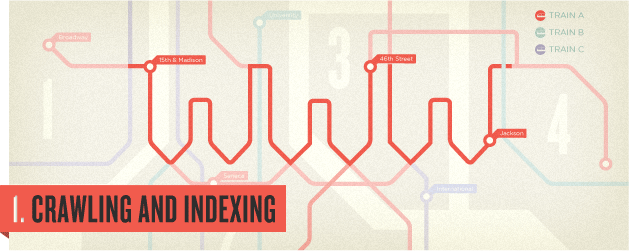
Imagine the World Wide Web as a network of stops in a big city subway system.
Each stop is a unique document (usually a web page, but sometimes a PDF, JPG, or other file). The search engines need a way to “crawl” the entire city and find all the stops along the way, so they use the best path available—links.
The link structure of the web serves to bind all of the pages together.
Links allow the search engines' automated robots, called "crawlers" or "spiders," to reach the many billions of interconnected documents on the web.
Once the engines find these pages, they decipher the code from them and store selected pieces in massive databases, to be recalled later when needed for a search query. To accomplish the monumental task of holding billions of pages that can be accessed in a fraction of a second, the search engine companies have constructed datacenters all over the world.
These monstrous storage facilities hold thousands of machines processing large quantities of information very quickly. When a person performs a search at any of the major engines, they demand results instantaneously; even a one- or two-second delay can cause dissatisfaction, so the engines work hard to provide answers as fast as possible.

Search engines are answer machines. When a person performs an online search, the search engine scours its corpus of billions of documents and does two things: first, it returns only those results that are relevant or useful to the searcher's query; second, it ranks those results according to the popularity of the websites serving the information. It is bothrelevance and popularity that the process of SEO is meant to influence.
How do search engines determine relevance and popularity?
To a search engine, relevance means more than finding a page with the right words. In the early days of the web, search engines didn’t go much further than this simplistic step, and search results were of limited value. Over the years, smart engineers have devised better ways to match results to searchers’ queries. Today, hundreds of factors influence relevance, and we’ll discuss the most important of these in this guide.
Search engines typically assume that the more popular a site, page, or document, the more valuable the information it contains must be. This assumption has proven fairly successful in terms of user satisfaction with search results.
Popularity and relevance aren’t determined manually. Instead, the engines employ mathematical equations (algorithms) to sort the wheat from the chaff (relevance), and then to rank the wheat in order of quality (popularity).
These algorithms often comprise hundreds of variables. In the search marketing field, we refer to them as “ranking factors.” Moz crafted a resource specifically on this subject
How Do I Get Some Success Rolling In?
(or How search marketers succeed )
Say you have a presentation with a very powerful message about the mission of your brand. You’re qualified to speak on the subject matter because you live and breathe it — and your audience cares, because what you do makes a difference in their lives.
Your goal is to get this message in front of as many people as you can. So you sign up to talk at professional organizations, networking events, industry conferences, small groups of decision-makers and so on.
After years of giving this presentation, you realize that there’s one particular group of people who represent the most opportunity for your brand — those who want to receive your message and are most responsive to it. You observe that these people have certain characteristics and may even live within a particular region. To maximize your ROI, you’ll want to ensure that you are tapping into this group in a meaningful way.
This is the scenario brands face today online: working to get the right message in front of the right people. When harnessed properly, organic search presents one of the greatest opportunities to find those with whom your message will resonate best.
Content Marketing Is Big
Content marketing is in full swing. In fact, one statistic shows that brands invested upwards of $44 billion in content last year.
Yet, many brands still struggle when it comes to content marketing strategy. According to a survey conducted by BrightEdge (which concluded in January of this year), 93% of marketers say they would increase content budgets by at least 10 percent in 2014 if they could identify what content is the most effective for engaging their audience.
Additionally, a majority of marketers are increasingly looking to organic search as a means to drive content ROI.
WEB Masters.
SEO INFORMATION FROM GOOGLE WEBMASTER GUIDELINES ...
Google recommends the following to get better rankings in their search engines :
- 1- Make pages primarily for users, not for search engines. Don't deceive your users or present different content to search engines than you display to users, a practice commonly referred to as "cloaking."
- 2- Make a site with a clear hierarchy and text links. Every page should be reachable from at least one static text link.
- 3- Create a useful, information-rich site, and write pages that clearly and accurately describe your content. Make sure that your <title> elements and ALT attributes are descriptive and accurate.
- 4- Use keywords to create descriptive, human-friendly URLs. Provide one version of a URL to reach a document, using 301 redirects or the rel="canonical" attribute to address duplicate content.
SEO INFORMATION FROM BING WEBMASTER GUIDELINES..
Bing engineers at Microsoft recommend the following to get better rankings in their search engine:
- Ensure a clean, keyword rich URL structure is in place.
- 1- Make sure content is not buried inside rich media (Adobe Flash Player, JavaScript, Ajax) and verify that rich media doesn't hide links from crawlers.
- 2- Create keyword-rich content and match keywords to what users are searching for. Produce fresh content regularly.
- 3- Don’t put the text that you want indexed inside images. For example, if you want your company name or address to be indexed, make sure it is not displayed inside a company logo.





Post a Comment
Please Don't Spam You are allowed to comment your website link